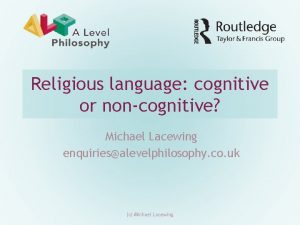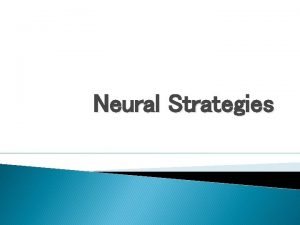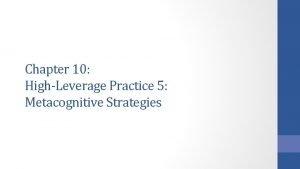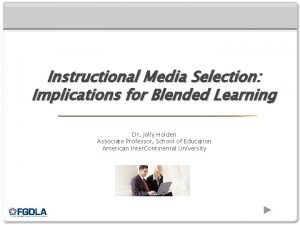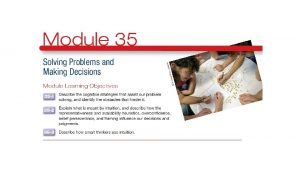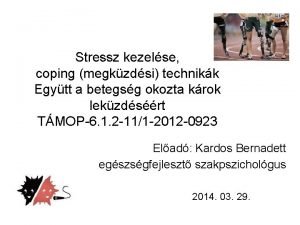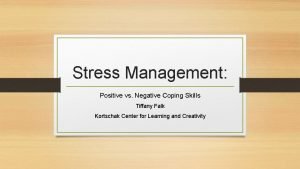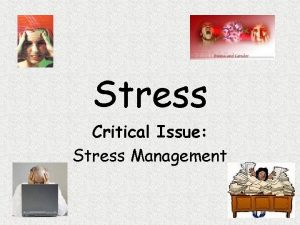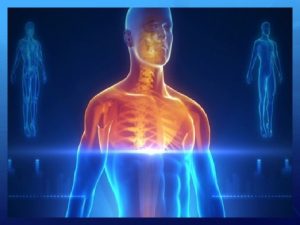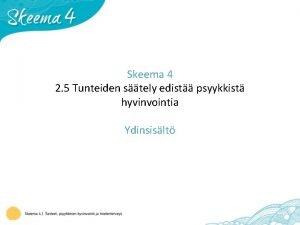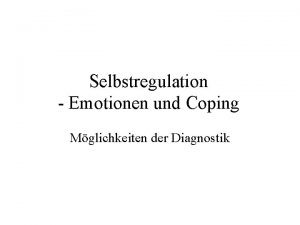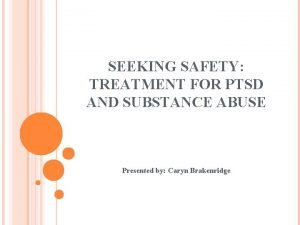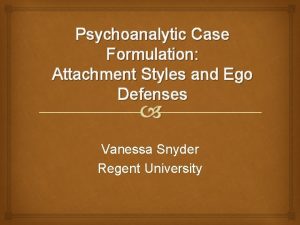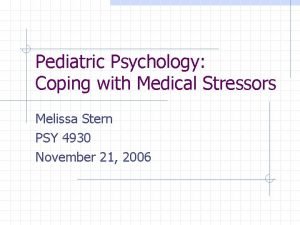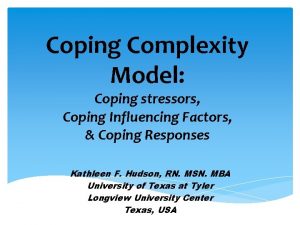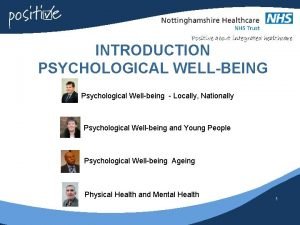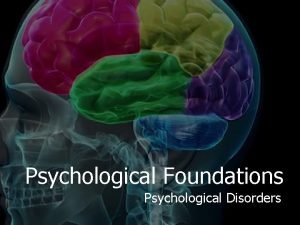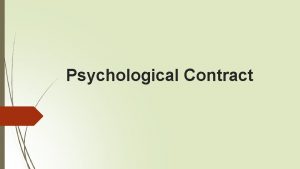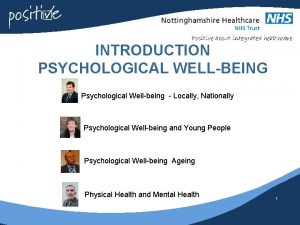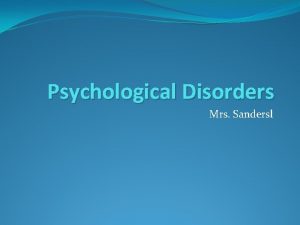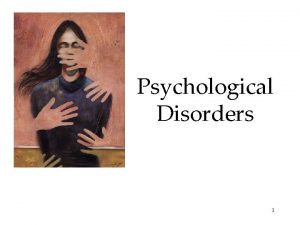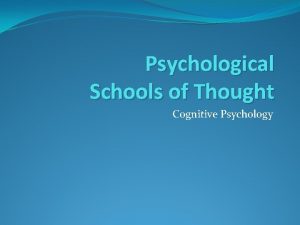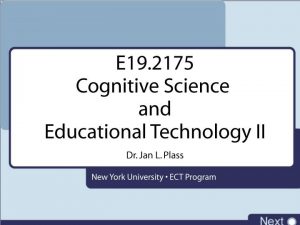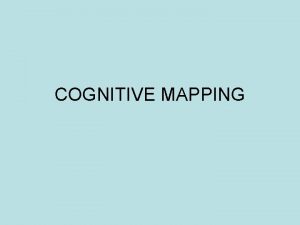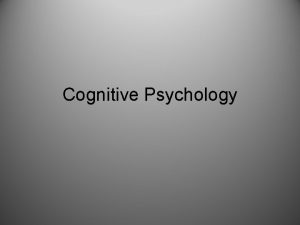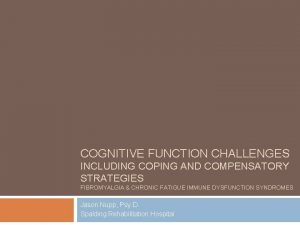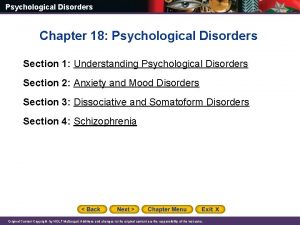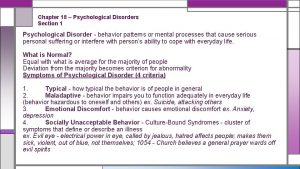SECTION 3 COPING STRATEGIES PSYCHOLOGICAL COPING STRATEGIES Cognitive




















- Slides: 20

SECTION 3: COPING STRATEGIES

PSYCHOLOGICAL COPING STRATEGIES § Cognitive appraisal: the interpretation of an event that helps determine the stress impact § Key is to approach stressors in a positive way § View them as challenges, not obstacles

DEFENSIVE COPING STRATEGIES § Denial: when a person decides the event is not really a stressor § Intellectualization: when a person analyzes the situation from an emotionally detached viewpoint

Involve changing our environment or modifying a situation to remove stressors ACTIVE COPING STRATEGIES

HARDINESS § Refers to the personality traits of control, commitment, and challenge § Control: we have the ability to affect an outcome § Commitment: establishing/ pursuing our goals § Challenge: actively confronting/ solving problems

PROBLEM SOLVING § Regarding conflicts as problems to be solved § Problems become positive challenges rather than negative setbacks § It involves a rational analysis of the situation that will lead to an appropriate decision § A very healthy strategy that sharpens insights and attention to detail and develop flexibility

EXPLANATORY STYLE § Martin Seligman---2 types of thinking: § 1) Optimist § 2) Pessimist

RELAXATION § Many techniques § Progressive relaxation: lying down comfortably and tensing and releasing the tension in each major muscle group in turn---developed by Dr. Edmond Jacobson § Meditation: focusing of attention with the goal of clearing one’s mind and producing an “inner peace”

BIOFEEDBACK § The process of learning to control bodily states by monitoring the states to be controlled § Usually need machinery

HUMOR § “Laughter is the best medicine” § Can increase blood flow § Laughing releases tension § It helps us deal with intense emotional pain of a loss

EXERCISE § Stimulates and provides an outlet for physical arousal § Burns off stress hormones § David Holmes: aerobic exercise reduces cardiovascular response and arousal following stressful events

OTHERS § Support groups and Professional help § Training: preparation eases stress § Improving Interpersonal skills: most stress stems from interpersonal relationships

SECTION 4: STRESS IN YOUR LIFE For many people , college and work involve adjustment and stress

AUTONOMY § The ability to take care of oneself and make one’s own decisions § This is what growing up is all about

CHOOSING A COLLEGE § One of the 1 st big steps toward autonomy § Most go in with unrealistic aspirations and expectations § Most experience “college shock”--unaware of realities of responsibility required for college

SOURCES OF CHANGE IN COLLEGE § New friends § Friendships may challenge ideology § Developmental friendships: friends force one another to reexamine their basic assumptions and perhaps adopt new ideas and beliefs

COPING WITH CHANGE § Some practice resynthesis: combining old ideas with new ones and reorganizing feelings in order to renew one’s identity

WORK SATISFACTION AND DISSATISFACTION § Examined by Industrial/organizational psychs § High job satisfaction leads to higher productivity § 5 major sources of work satisfaction: § 1) Resources § 2) Financial reward § 3) Challenge § 4) Relations with coworkers § 5) Comfort

CHANGING CAREERS § Career: a vocation in which a person works at least a few years § Most will change careers many times in their life § Work satisfaction is major cause of change § Availability of jobs effects the level of dissatisfaction tolerated in current career

COMPARABLE WORTH § Idea that women and men should receive equal pay for jobs calling for comparable skill and responsibility § Equal Pay Act of 1963 and Civil Rights Act of 1964 protect against discrimination in the workplace
 Cognitive and non cognitive religious language
Cognitive and non cognitive religious language Coping strategies for exam stress
Coping strategies for exam stress Neural recovery
Neural recovery Cognitive strategies
Cognitive strategies Metacognitive essay
Metacognitive essay Affective message strategy
Affective message strategy Definition of cognitive strategies
Definition of cognitive strategies Definition of cognitive strategies
Definition of cognitive strategies Per se
Per se What cognitive strategies assist our problem solving
What cognitive strategies assist our problem solving Siegristin malli
Siegristin malli Lazarus megküzdés
Lazarus megküzdés Negative coping
Negative coping Problem-focused coping examples
Problem-focused coping examples Reaction formation
Reaction formation Skeema 4
Skeema 4 Copingstrategien
Copingstrategien What is seeking safety
What is seeking safety Wood parapet
Wood parapet Attachment style chart
Attachment style chart Coping styles psychology
Coping styles psychology
